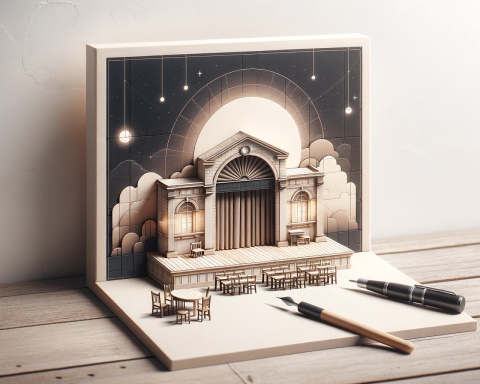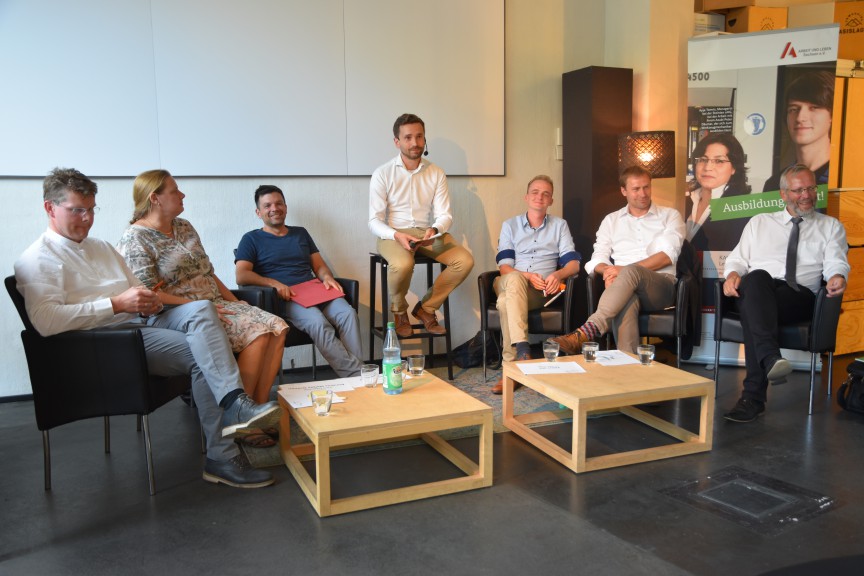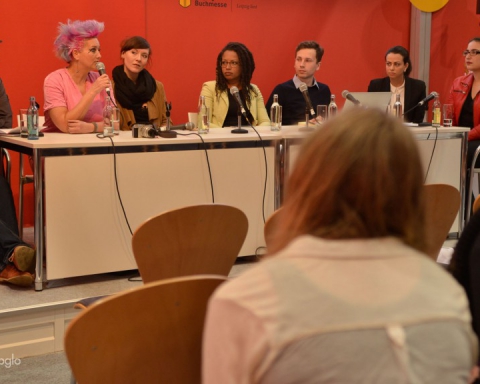English Theatre Leipzig is staging a new play, Eurydice, at Neues Schauspiel Leipzig. Starting with the premiere on Thursday, September 5th, there will be 5 shows, so everyone will have an opportunity to see it. We had a chance to chat with the play’s director, Julia Kragh, to find out what to expect.

In a nutshell – what’s the play about?
This play is about different kinds of love, obsession, loss, and reconnecting. And music.
In Eurydice, Lethe is the river of forgetfulness. It has a central role in the play. How do you put the river of Sarah Ruhl’s mystical underworld on stage?
Sarah Ruhl likes mixing mythological concepts with modern references. Instead of a river, the script calls for an elevator as the transition point to the underworld. When the dead reach their new destination it starts to rain inside the elevator, washing away all memories of their past lives. It was definitely a challenge in terms of scenic design. You’ll need to come see the show to see how we solved it!
There’s a crowdfunding goal you’ve got for staging your play. What is it for and how has it been going?
We hope to be able to fund the material for scenic design.
Our ambition is to really transform the given space, to take the audience on a journey to the underworld. Peter Klippell, our fabulous Scenic & Lighting Designer, is building most of it from scratch – including a fully functioning fountain! People who have watched our shows before know how detailed our scenic design can be. As for the progress, we already received a couple of very generous donations. We still have some ways to go, so it would be incredible if a few more people would donate to help us get there by August 31st.

How have the rehearsals been going? Are you happy with the cast and the progress?
The rehearsals have been going great. Neues Schauspiel Leipzig is currently on summer break, and we had the great privilege to have the place to ourselves. Of course, rehearsing during the summer can also be a challenge due to vacations and other scheduling conflicts, but the cast has been incredible from the start. We were able to get a bunch of new people on board, as well as some well-known faces. (Editor’s note: Abigail Akavia, the lead in Proof, directed two scenes in Exit Stage Right. Danny Coposescu and Emily Wessel both played in Exit Stage Right).
Let’s go back to the play. Can you tell us a little more about the play and the symbolic significance of water?
I fell in love with this play because it changed the perspective on a story that has been told time and time again. Through poetry, music, film, opera – you name it. As one of the characters in the play says: “Orpheus was a great musician. Eurydice was his wife. She died.” Most adaptions of this myth tell us next to nothing about her. She dies on their wedding day, and Orpheus goes to the underworld and tries to get her back. But what happened to her there after her sudden death? Here we get to find out.
In this play, people die and move to the underworld by immersing themselves in the river of forgetfulness.

It washes away everything, from their memories to their language. The audience can watch how this affects the characters and their relationships. One of Sarah Ruhl’s additions to the story is Eurydice’s father. In the underworld, he is a subversive – he can still read and write. He tries to give his daughter her words back, hoping that she will remember him as well. Sarah Ruhl wrote Eurydice in honour of her father, who passed away. They shared a great joy for language and the origin of words, and so this was her way of having another conversation with him.
You mentioned analogies to Greek mythology and Orpheus. What allusions and parallels are there?
As in the original, Orpheus loses his wife.
He mourns, he grieves, and then decides to get her back in the only way he knows how – through his music. Then he strikes a deal with the lord of the underworld, but as we know, there is always a twist when bargaining with the gods. He must leave the underworld with Eurydice following right behind him. If he looks back, she will be gone forever. So the premise of the story stays the same. Whether or not the outcome will be the same, this you need to see for yourself.

How did you tackle the musical challenge?
Because music is such an integral part of this story and we always try to show our audience something new, English Theatre Leipzig is collaborating with Parwaneh Mirassan to produce our first ever show with live music. As our very own Calliope – one of the muses and Orpheus’s mother – Parwaneh is using her own compositions and loops to transport the audience to the underworld.
Any exciting costumes?
Our costume designer, Thea Wagner, used a lot of references to Greek mythology in creating the outfits for this show. I especially like the little nod to Eurydice’s cause of death in the myth. See if you can spot it!
Give us one good reason why we cannot miss seeing the play?
Theater is one of the only places where you can speak to the dead. They are dying to meet you. 🙂
Thank you, Julia! See you at the Neues Schauspiel – and break a leg!











